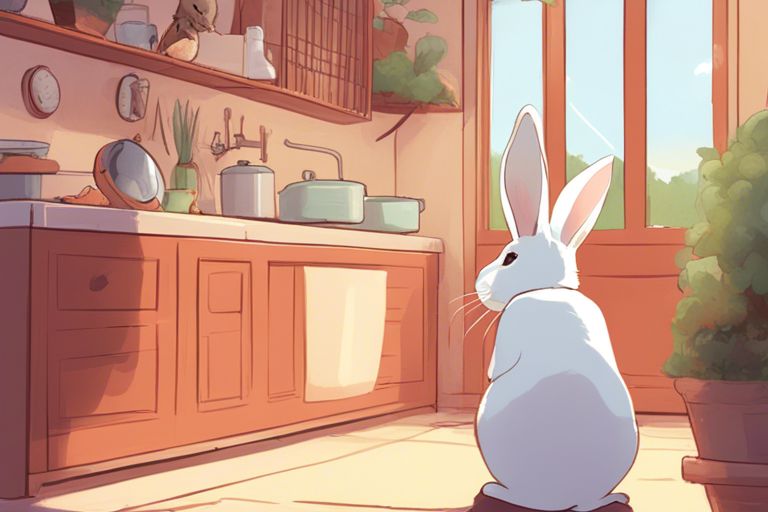Are you struggling with your rabbit’s aggressive behavior towards other rabbits, animals, or people? It’s essential to address this issue as soon as possible, as aggressive behavior in rabbits can pose a danger to themselves and those around them. However, with the right approach and consistent training, you can effectively prevent your rabbit from becoming aggressive. In this blog post, we will discuss some key strategies to help you address and prevent your rabbit’s aggression.
Recognizing Aggression in Rabbits
Your ability to recognize signs of aggression in rabbits is crucial in preventing potential conflicts with other rabbits, animals, or people. Understanding the cues and factors contributing to aggression can help you take proactive measures to address and manage this behavior.
Signs of Aggressive Behavior
Signs of aggressive behavior in rabbits can include lunging, boxing, biting, growling, or chasing other rabbits or animals. Aggression towards people may be displayed through biting, scratching, or thumping with their hind legs. It’s essential to closely observe your rabbit’s body language and behavior to identify any potential signs of aggression.
Factors Contributing to Aggression
Several factors can contribute to aggression in rabbits, including territorial behavior, sexual maturity, fear or stress, and personalities of individual rabbits. Improper socialization, overcrowding, or lack of space can also lead to aggressive behavior. Perceiving and addressing these contributing factors can help in preventing and managing aggression in rabbits.
Preventing Aggression
One of the most important things you can do to prevent your rabbit from becoming aggressive towards other rabbits, animals, or people is to provide proper socialization and a safe, stimulating environment.
Proper Socialization Techniques
When introducing your rabbit to other animals or people, it’s important to do so in a controlled and supervised manner. Start with short, supervised interactions and gradually increase the duration as your rabbit becomes more comfortable. Use positive reinforcement, such as treats or praise, to reward your rabbit for calm and non-aggressive behavior. Additionally, ensure that your rabbit has been spayed or neutered, as this can reduce aggressive behavior towards other rabbits.
Creating a Safe and Stimulating Environment
Ensure that your rabbit has a safe and stimulating environment to prevent aggression. This includes providing plenty of space to exercise, stimulating toys and activities, and a designated hiding spot for your rabbit to retreat to when feeling stressed. Additionally, make sure that your rabbit has access to fresh food, water, and a clean living area at all times. By providing a safe and stimulating environment, you can help reduce stress and prevent aggressive behavior in your rabbit.
Intervention and Correction
Now that you have identified aggressive behavior in your rabbit, it is important to take the necessary steps to intervene and correct this behavior. Ignoring the aggression or hoping it will go away on its own is not a viable solution. It is crucial to address the issue promptly to prevent further escalation.
Methods to Correct Aggressive Behavior
When your rabbit displays aggression towards other rabbits, animals, or people, it is important to intervene immediately. One method to correct aggressive behavior is to establish yourself as the dominant figure in the rabbit’s life. This can be done through positive reinforcement training and consistent, firm discipline. Additionally, you can create a structured environment for your rabbit, providing clear rules and boundaries to follow. Encouraging non-aggressive behaviors with treats and rewards can also be effective in correcting aggressive tendencies.
When to Seek Professional Help
If your rabbit’s aggression does not improve despite your best efforts, it may be time to seek professional help. Aggressive behavior in rabbits can be dangerous, especially if it escalates to physical attacks. If you are unable to control your rabbit’s aggressive tendencies, or if the aggression poses a risk to the safety of other animals or people, it is crucial to consult with a veterinarian or an animal behaviorist. They can provide expert guidance and develop a customized behavior modification plan to address the aggression in your rabbit.
Maintaining a Peaceful Coexistence
Despite your best efforts at preventing aggression in your rabbit, it’s important to take proactive steps to maintain a peaceful coexistence with other rabbits, animals, and people. This involves ongoing socialization and training, as well as monitoring and adapting to any behavioral changes that may arise.
Ongoing Socialization and Training
Continue to socialize and train your rabbit to interact peacefully with others. Introduce new rabbits or animals slowly and in a controlled environment. Use positive reinforcement techniques, such as treats and praise, to encourage good behavior. Consistently reinforce boundaries and rules for interaction to prevent any aggressive tendencies from developing. Regular handling and interaction with your rabbit will also help to ensure they remain well-adjusted and friendly towards others.
Monitoring and Adapting to Behavioral Changes
Keep a close eye on your rabbit’s behavior and be alert to any changes that may indicate aggression towards other rabbits, animals, or people. This includes signs such as lunging, growling, biting, or territorial behavior. If you notice any concerning behavior, it’s important to address it immediately. Seek guidance from a veterinarian or animal behaviorist if you are unsure how to handle the situation. Be prepared to adapt your approach and make any necessary changes to your rabbit’s environment or routine to prevent any escalation of aggressive behavior.














